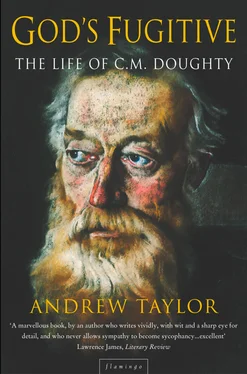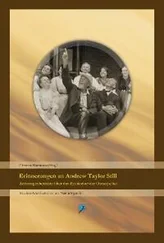It is the tents, not the stone walls, that achieve immortality. One of the first things he notices later, when he reaches the ruins of Medain Salih, is the way that the stones lining the well, still used by the travelling Arabs, are scored by the ropes of generations of beduin, hauling up their water. ‘Who’, he asks, ‘may look upon the like without emotion?’
His search for ancient remains was almost obsessive: the Arabs, he said impatiently, were ‘too supine and rude’ to work out how many ruins there were, but in two days’ riding near the town of Kerak he claimed to have visited about forty separate sites. There were disappointments, of course – sites with carvings and inscriptions that he was unable to find, and others that he decided were not worth the visit – but it was among these ruins that he began to form his views of the Semitic culture and the Semitic people.
These travels also helped, incidentally, in forming his estimate of the value of oral evidence: some stories, like some sites, were worth more than others. At the Roman site of Jerash, he was told, there was the grave of the Islamic prophet Hud – who, he added tartly, ‘lies buried in more places in Arabia’. There was the now-sanctified Alexander the Great, whose body was to be found – ‘if you will believe them’ – under a heap of stones at Rabbath Moab; and at Kerak he was shown the sepulchre of Noah – ‘who is, notwithstanding buried, at great length, in other places’. Later, as he travelled through Arabia, he was to hear stories of the miracles he was supposed to have performed himself, lifting huge boulders with a single touch of his fingers – ‘and yet at such times I was sleeping, encamped with the Aarab , * nearly half a mile distant …’ 12
But it was not only old wives’ tales about famous graves that aroused Doughty’s scepticism. Travelling around the Holy Land was further undermining the foundations of his belief, which had already been so dangerously chipped away by his scientific studies. Everywhere, he saw the impossibility of accepting much that he had read for years in his Bible.
He liked to use the Bible as a historical guide, and he was not afraid to test its assertions against science and logic. His own slow progress across the desert set him thinking about the exodus of the Jews from Egypt – two and a half million people, six million camels and seven million cattle. When he asked whether even the whole of Sinai, the worst pasture in the world, could have kept them alive, it was no more than the sort of question that scientists had already started asking of the Scriptures – but Doughty’s presence there in the desert lent it a new point and strength. On all sides, his religion was under attack.
He saw, too, the frequent gulf between faith and human kindness, and the way that religious fanaticism could actually shrivel up ordinary, decent humanity. The man whose faith had already been shaken by his studies in libraries and laboratories was now seeing it put under further strain by his own experience in the world.
There was little enough emotional support from the Greek Christians who lived among the Arabs – a ‘lickdish peasant priest’ at Kerak and his congregation, for instance, among whom Doughty found no evidence of sanctity or a Christian life. ‘To the stronger Muslims I would sooner resort, who are of frank mind and, more than the other, fortified with the Arabian virtues,’ he commented. 13 It was a telling condemnation from a man who was later to be criticized for his unbending attitude towards the faith of his Muslim hosts.
But he had no illusions about the generosity and humanity of the devout Muslims either. Later, when he set off with the Hadj, he would see a dying beggar by the wayside, ignored by the passing pilgrims, but then picked up and helped by one of Doughty’s own servants, ‘a valiant outlaw, no holy-tongue man, but of human deeds’. 14 In another bitter moment, he exploded: ‘Religion is a promise of good things to come, to poor folk, and many among them are half-destitute persons. Oh what contempt in religions of the human reason!’ 15
In both comments he was speaking specifically about Islam, ‘the dreadful-faced harpy of their religion’ – but his choice of words is significant. It was not only Islam, but religion as a whole, that seemed to have failed.
His quarrel, in fact, was with neither Islam nor Christianity, but with the rigidity of both; his respect, then as always, for the relation between the individual and God. The Hadj might be, as he suggested, a cruel deception practised on the guileless pilgrims; perhaps there was nothing but contempt due to the more ostentatiously devout among them and their ‘loathsome washings’. But their patience, their determination, their religious stamina, could only impress him. ‘There are very few who faint: the Semitic nature, weak and quick metal, is also of a wonderful temper and longsuffering in God,’ he wrote. 16
For the first time in his travels his interests started to encompass the welfare and the day-to-day life of the people among whom he was living. Where before he showed no interest in the politics of the countries through which he was travelling, he now noticed indignantly the debilitating effect of the incompetence, inefficiency and corruption of the tottering Ottoman empire. ‘The name of the Sultan’s government is a band of robbers,’ he wrote. 17
At least some of the barren land, he suggested, could be reclaimed for crops, much as the Arabs ploughed the soil around their villages to eke out a scanty living. Towns and villages, deserted for centuries, might easily be reoccupied: in the ruined city of Umm Jemal he walked through narrow streets and courts choked with giant weeds, his sandals soft on the basalt slabs underfoot. The stone-built houses still had their roofs and walls intact; only the people were missing. ‘The “old desolate places” are not heaps and ruins, but carcases which might return to be inhabited under a better government: perhaps thus outlying, they were forsaken in the Mohammedan decay of Syria, for the fear of the Beduins,’ he wrote, with a touching faith in the power of strong government. 18 It was, he said, only the lack of such strength and determination that stood in the way: the impoverished Ottoman empire was unable even to pay the wages of its soldiers, or to repair the roads and bridges which were falling into ruin.
The European powers, of course, were only too anxious to make what profit they could from the Ottoman empire. For several decades would-be entrepreneurs had cast a greedy eye on the underdeveloped Ottoman wastes: the historian Sir Edward Creasy was only one voice among many when he predicted, ‘With improved internal government, European capital will be poured into Turkey, and will enrich the land where it is employed … the busy hum of European industry will increase and find innumerable echoes …’ 19 That was the optimistic prediction of the 1850s; what had happened in fact was that heavy borrowing and spending in European markets had bankrupted the empire by the mid 1870s.
But while Doughty was a fervent patriot and a dedicated nationalist, he was never an imperialist. He had little interest in the growth of empire for its own sake, and none of the exaggerated estimation of many empire-builders of the abilities of his countrymen. He for one saw little prospect of wealth for either side in talk of western settlers taking over the land. There was, he said, no reason to suppose that the first generation of European settlers would be any more successful than the Arabs in tilling the desert, while succeeding generations would be moulded by the environment in which they lived. ‘Were not the sending of such colonists to Syria, as the giving of poor men beds to lie on, in which others had died of the pestilence?’ 20
Читать дальше












